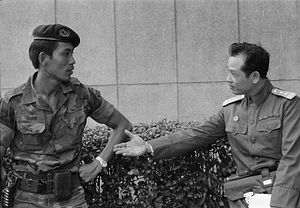Colonel Bui Tin, a prominent North Vietnamese communist, journalist, and defector who accepted the unconditional surrender of South Vietnam in April 1975 has died in a Paris suburb, aged 90. His death was ignored in Hanoi.
As a journalist and propagandist — in an era that predated concepts of fake news – Col. Tin was masterful, making history when tanks stormed into the Presidential Palace in Saigon and he confronted General Duong Van “Big” Minh, the appointed leader as his country fell.
Gen. Minh told Col. Tin he had been waiting since early morning to transfer power. Tin then delivered his famous reply: “There is no question of your transferring power. Your power has crumbled. You can not give up what you do not have.”
It was an historic moment that ended Vietnam War, and paved the way for political unification of the two Vietnams in July the following year.
Col. Tin’s communist credentials were impeccable.
He was an ardent admirer of Ho Chi Minh and his revolutionaries, a veteran of the battle of Dien Bien Phu in 1954, which ended French colonialism in Indochina, and later he helped shape and turn public opinion in the West against a war that engulfed the United States
He became deputy editor in chief of the army newspaper Quan Doi Nhan Dan, and the Vietnamese equivalent of Pravda, Nhan Dan, and was also a part of the 1978 Vietnamese invasion of Cambodia, prompted by Khmer Rouge cross-border incursions.
Vietnamese occupation exposed Pol Pot’s atrocities that left up to 2.3 million people dead and would install Hun Sen as prime minister, a post he still holds today.
Following the communist victory, Col. Tin forged close ties with Pham Xuan An, the star reporter who worked in the Western media, winning the trust of Time magazine and Reuters, from his base in Saigon as a cover for his secret espionage work for Hanoi.
An also held the rank of colonel and would later be promoted to Brigadier General.
But both men had become disenfranchised with the new regime and its brand of communism that had, and still does, held little tolerance for free speech and was widely viewed by southerners as arrogant, ignorant, iron-fisted, and corrupt
Both men wanted to defect and Tin succeeded in 1990 while attending a meeting organized by l’Humanite communist newspaper in Paris, where he became a harsh critic of the regime he once supported. In Hanoi he was dismissed, effectively as persona non grata.
An’s attempts to defect proved luckless, despite efforts by Col. Tin to help.
In 2002, Col. Tin was tied to the “reactionaries” in France and the Pluralist Democracy Foundation by the communists where he assisted in establishing what would become the Democratic Youth Foundation.
According to Hanoi, it had the “aim of gathering youths and coordinating with hostile forces both in and outside Vietnam to sabotage the State and demand a change in the political regime in Vietnam.”
Throughout, Col. Tin and his supporters insisted he was “a real journalist” who advocated democratic ideals and that his life with the communists was born more out of his sense of nationalism than the harsh doctrine that would accompany “liberation.”
There is much merit in that argument. But for the better part of his life Col. Tin had supported a regime that ignored international agreements and waged wars across its borders, annexing South Vietnam into a one-party communist state intolerant of dissent.
It’s a legacy that many Vietnamese at home and in the diaspora abroad remain embittered about, as Col. Tin spent the rest of his days in the Paris suburb of Montreuil, before succumbing to kidney failure.
Luke Hunt is a Southeast Asian correspondent for The Diplomat and author of the Punji Trap — Pham Xuan An: The Spy Who Didn’t Love Us.

































